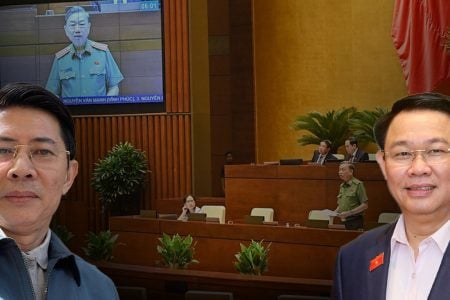
The US has just adopted a new regulation that tightens control over China’s state-run media because of concerns it is a means for the Communist Party of China (CPC) to propagate one-way propaganda to the Free and Democratic countries.
The US will begin to treat five major Chinese media outlets operating in the US as foreign embassies. Accordingly, these agencies will be required to register their staff and assets with the US Department of State.
The decision will apply to Xinhua, China CCTV Global Television Network, China International Radio, China Daily and the Development Agency Hai Tian.
These five agencies, while operating in the US, will have to notify the names of their personnel managers, decisions on hiring and firing, and registering assets they rent or buy in the US with the US Department of State. Prior to renting or buying new properties in the United States, these agencies must also have U.S. approval.
The decision was made because China was tightening control over its communication system, and Chinese President Xi Jinping increased the use of media to propagate Beijing’s policies. .
“Content control and editorial were only strengthened under Xi Jinping’s rule,” an official said. “These organizations are in fact the propaganda arm of the CPC.”
China is set to be informed about this decision on Feb 18.
The Guardian quoted an unnamed official as saying, “There is no doubt that these five agencies are part of the state propaganda machine [China] and they receive orders directly from the top leaders.”

“We all know that these agencies are state-controlled, but that control becomes tighter over time, and becomes a lot tougher,” he said.
In December last year, Senator Jim Banks asked Congress to investigate China Daily’s propaganda into the US Congress.
Congressman Banks believes that China Daily has violated federal law and will suffer the consequences. Liberty Lighthouse previously revealed how China Daily repeatedly violated the Law of Foreign Representative Registration.
The article wrote China Daily, which is the official mouthpiece of the CPC, has so far published hundreds of propaganda articles in the New York Times, Washington Post and at least 30 other US media channels.
These articles may look like regular news in the US newspaper, but the fact that these propaganda beautifies the CPC government and from the beginning to the end blurs the CPC’s human rights abuses.

Chinese authorities strictly control the media. All state-owned press agencies are subject to strict censorship in accordance with government guidelines. With the Internet, Beijing has set up a system called the Great Firewall, which prevents its citizens from accessing popular websites like Youtube, Facebook, and Twitter.
The official noted that China may retaliate but said that Chinese journalists in the US were allowed to operate in a free press environment there. Meanwhile, when Western journalists come to China to report and write articles, they face many serious limitations in their operations.
“These entities operate in a much freer environment in the US than any foreign press enjoyed in the People’s Republic of China,” the official said.
The Donald Trump administration has recently increased its pressure on China in a range of areas, from imposing tariffs in the war, to strongly criticizing Beijing’s re-education camp system in Xinjiang.
A recent study by Freedom House – an American research institute – found that China has sought to advance its message, highlighting the terrorist threat from Uighurs and repeating that pro-democracy protesters in Hong Kong were armed with weapons.
The study said China’s People’s Daily increased spending in the US, from $500,000 in the first half of 2009 to more than $5 million in the second half of 2019.
In developing countries, China has rapidly expanded its media presence by providing television programs, in order to increase its influence.
Accordingly, the main objective of this effort was initially to establish China’s image as a reliable partner, but it was later used to appeal to support Beijing’s position on Tibet and Taiwan.
“China spent $9 billion in 2009 to build an international broadcasting and publishing network, with the majority of the money going to China International Radio (CRI),” the report said.

In 2019, China has 854 million Internet users, becoming the largest market but also the country with the most sophisticated censorship system on the planet. In 2017, the CPC enacted the Cyber Security Law, which significantly reduced the number of posts on Chinese blogging platforms such as Sina Weibo (similar to Twitter).

In addition to applying sophisticated technologies such as “Great Firewall,” “Golden Shield” or “Cannon,” the Chinese government also wants to “shape” people’s minds by recruiting public opinion in 2004.
Public opinion shappers are those who only have to sit and read comments under the articles, “adjust” to the Party’s guidelines, and if necessary, can make negative comments, or curse to discourage readers, as well as “blacklisting” comments that are not in the opinion of the CPC.
These people are called the 50-cent Party because they are paid 50 cents for each comment. A Harvard study in 2016 estimated that there were more than 2 million active public opinion shappers, posting about 450 million comments / year on social media, and the CPC also hired an additional 100,000 people just to manually delete posts “sensitivity” on social networks.
The CPC used its iron fist to silence people who support reform, democracy and open the Internet, to mobilize party members to memorize Party regulations and support the Party’s values, and at the same time prevent external ideas permeate China’s political and social life.
For more than two decades, the CPC has blocked Google, Facebook, Twitter, Instagram as well as tens of thousands of foreign websites, and “cultivated” many domestic social networks Weibo and Tencent under the supervision of the Beijing government. By strictly censoring the Internet, a generation of young people born in China in the 1990s and 2000s were almost completely unaware of the world Internet.
They hardly know FB, Twitter, or Google, etc. and are just used to using online search and applications like Baidu, social media service WeChat and video platform Tik Tok. This helped the CPC build a value-oriented system to replace Western democratic and liberal values.
Even when Western apps and websites get into China (Facebook and Google now have small branches in China), the two big boys still face the indifference of young people in China because they grew up with Baidu, WeChat and familiar with domestic applications.
They found the US unsafe with many murder shootings, Europe in a “chaos” of division and disagreement, Hong Kong was chaotic by demonstrations caused by rioters. They feel China is so peaceful and so beautiful. These are also the things that the CPC allows them to know freely on “domestic” social networks.
When the giant Tencent surveyed more than 10,000 young Chinese born in 2000 or later, 80% answered that China was at the best time in history and increasingly powerful. The same percentage indicates that they love their country (love the Party) and are optimistic about the future.
A Stanford University survey has concluded that students in China are indifferent to censored news. They gave 1,000 students at two universities in Beijing free tools to bypass “firewalls,” but half of them didn’t use them.

With the technology ecosystem flourishing in the country, Chinese netizens do not have much reason to overcome this wall because ” China has all applications.”
This illustrates the gloomy truth that by blocking the world’s Internet connection, establishing the domestic social networks, the CPC’s censorship was effective: Not only did it make it difficult to access such information from the outside world, but it is also causing the Chinese people to gradually lose the need to know “sensitive” information in the country.
With such “brainwashing”, the CPC succeeds in “cultivating” a younger generation indifferent to political life, worshiping consumerism and zealous nationalism. Dangerously, this trend is currently being increasingly tightly established by the CPC, and is “exporting” this censored Internet model to other countries.
However, in the face of the outbreak of the “Wuhan pneumonia” epidemic, when each person’s destiny is at stake and the deceitful nature and the CPC’s strict censorship of information are exposed, whether or not Chinese people can continue to be indifferent, please wait for the answer ahead.
China and Vietnam are the two remaining countries in the world that still impose the model of communism to rule the people, without freedom of speech and independent media.
What is more dangerous, is that the authorities in both Vietnam and China have carried out systematic repression of independent voices, in order to maintain the domination of the Communist Party. The time has come for change and millions of people will do it together.
Trung Hieu from Hochiminh city – Thoibao.de (Translated)




























